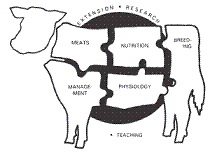Animal Science, Department of

Nebraska Beef Cattle Reports
Date of this Version
2024
Citation
2024 Nebraska Beef Cattle Report
UNL Beef, Institute of Agriculture and Natural Resources, University of Nebraska-Lincoln
Abstract
Methane is a more potent greenhouse gas than carbon dioxide. Because ruminant animals, including cattle, emit methane, strategies are actively being sought to reduce these emissions. Pistachio shell-sourced biochar was included at 0.5% of a finishing cattle diet to determine effects on methane emissions and cattle performance. Eight pens of cattle were rotated through a 2-chambered emissions barn to analyze methane and carbon dioxide produced by the cattle. Biochar tended to increase methane emissions on a g/d basis with no effect on methane emissions as g/lb of feed intake and no differences in carbon dioxide emissions. There were no differences in cattle performance and most carcass characteristics (daily gain, feed intake, feed:gain, hot carcass weight, ribeye area, marbling) between treatments. The control group did have increased 12th rib fat and yield grade scores compared to the biochar group. Feeding biochar at 0.5% of the diet did not impact enteric methane or cattle performance.
Included in
Large or Food Animal and Equine Medicine Commons, Meat Science Commons, Veterinary Preventive Medicine, Epidemiology, and Public Health Commons

